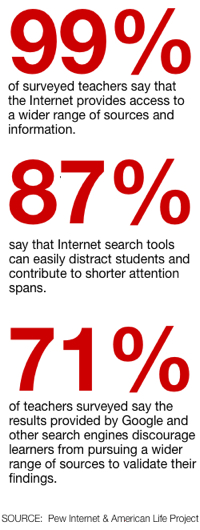Why Teachers Worry About Students’ Online Research Skills

Remember the days when conducting term-paper research meant an afternoon thumbing through the card catalog at your local library?
What’s that, you say? You’ve never heard of a card catalog?
In an age where even the oldest high school student is too young to remember the world B.G. (Before Google), it’s impossible to discount the ways in which the Internet has changed how students mine information online.
But, as a new survey of teachers from the Pew Internet & American Life Project cautions, not all of those changes have been for the better.
While 77 percent of Advanced Placement and National Writing Project instructors agree that the Internet and available search tools have had a “mostly positive” effect on student research, 87 percent say the same tools can easily distract students and contribute to shorter attention spans.
Even more disconcerting, 64 percent of respondents say modern digital technologies “do more to distract students than to help them academically.”
The news is not all bad. Of those teachers surveyed, 99 percent say that the Internet provides access to a wider range of sources and information; while 65 percent agree that the web has helped students become self-sufficient researchers.
But—and here’s the six-million-dollar question—has the Internet conditioned students to expect too much too fast?
Seventy-six percent of teachers surveyed “strongly agree” that students have unrealistic expectations for what they can find online. An even larger majority (83 percent) says the amount of information available on the web is overwhelming to students.
That’s not all. Seventy-one percent of teachers surveyed say the results provided by Google and other search engines discourage learners from pursuing a wider range of sources to validate their findings. A smaller but still significant majority (60 percent) says digital technologies make it tough for students to distinguish between credible and noncredible sources.
Does all of this suggest you should eschew Google and other mainstream search engines in favor of other, more refined research options? Your students are not likely to revert back to the card catalog, if that’s what you’re thinking. But, it does underscore the importance of a strong digital literacy program.
In fact, 47 percent of teachers surveyed say they “strongly agree” that digital literacy should be taught in school, while an additional 44 percent say they “somewhat believe” in the value of such courses.
So, where do you stand? Does the Internet help or hinder teachers’ ability to teach research in school? Should schools invest in digital literacy education? Or is that money better spent elsewhere? Tell us in the comments section.








